Overview
The article titled "10 Essential Insights on MCHAT Autism for Parents" highlights the vital role of the Modified Checklist for Autism in Toddlers (M-CHAT) as a screening tool for autism. Early screening using M-CHAT is not just important; it is crucial for identifying children who may be at risk for autism. By recognizing these risks early on, parents can access timely interventions that significantly improve developmental outcomes. Research supports this, showing that an early diagnosis can enhance social and communication skills in children.
As parents, understanding these insights can be both empowering and reassuring. You are not alone in this journey, and there are resources available to help you navigate the challenges. Engaging with M-CHAT can be a proactive step towards ensuring your child's well-being and development. Remember, the earlier the intervention, the better the chances for positive growth.
Let’s take this important step together. Explore the M-CHAT screening process and consider how it can benefit your child. Your proactive approach can make a world of difference in their developmental journey.
Introduction
In the intricate landscape of autism awareness and intervention, early detection is a pivotal factor that can significantly influence a child's developmental journey. The Modified Checklist for Autism in Toddlers (M-CHAT) serves as a vital screening tool, specifically designed to identify children at risk for Autism Spectrum Disorder (ASD) during crucial developmental stages. With its straightforward format and proven effectiveness, the M-CHAT not only facilitates timely interventions but also empowers parents to advocate for their children’s needs.
As families navigate the complexities of autism care, understanding the nuances of M-CHAT scoring, the importance of follow-up evaluations, and the broader implications of early screening can enhance outcomes for children and their families. This article delves into the critical aspects of the M-CHAT, offering insights and guidance for parents who are seeking to ensure the best possible support for their children. Together, we can foster a nurturing environment that promotes understanding and growth.
About ASD Media: Empowering Parents with Autism Resources
At ASD Media, we are dedicated to enhancing the implementation of ABA therapy by offering valuable insights and strategies that address the unique challenges faced by families and professionals. Our organization provides a comprehensive range of resources designed to support parents and caregivers, fostering a collaborative environment where experiences can be shared and knowledge exchanged. By subscribing to our newsletter, individuals gain access to the latest updates and unlimited digital resources tailored to their needs.
Our mission is to empower parents and professionals to unlock the potential of children with ADHD. We achieve this through effective strategies for managing challenging behaviors, navigating support services, and enhancing social skills development. Recent trends suggest that children with married or partnered parents are more likely to remain engaged in ABA therapy for extended periods, highlighting the critical importance of family involvement in the therapeutic process.
Additionally, we recognize that the financial burden of developmental disorder therapy can be overwhelming, with costs averaging around $60,000 annually. This reality underscores the vital role of insurance coverage in ensuring equitable access to necessary therapy services. As noted, "Many nonprofits and reputable private companies in the medical world have done the same," which emphasizes the collaborative efforts within the autism support landscape. At ASD Media, we acknowledge these challenges and strive to build a supportive community that promotes collaboration and growth in the ABA therapy sector, ultimately improving outcomes for young individuals and their families. We encourage parents to engage with our resources to navigate these challenges effectively.
M-CHAT Overview: A Key Screening Tool for Autism
The Modified Checklist for Autism in Toddlers is a vital screening tool for identifying children at risk for MCHAT autism. Featuring 20 simple yes-or-no questions, this tool focuses on crucial developmental areas like social interaction, communication skills, and behavior. Typically administered to children aged 16 to 30 months, it plays an essential role in early detection, which is key for timely intervention. Recent studies underscore its importance, revealing a sensitivity of only 39% in detecting ASD. This highlights the necessity for careful interpretation of results and the importance of follow-up assessments.
Pediatricians emphasize the value of early assessment tools like MCHAT autism, as they can lead to earlier diagnoses and improved long-term outcomes for children. This screening tool is widely utilized in pediatric practices, with ongoing updates to its psychometrics and procedures aimed at enhancing evaluation methods during well-child visits. Case studies indicate that universal screening for ASD, supported by the MCHAT autism tool, can significantly boost early detection rates. For instance, a study conducted in Singapore involving over 5,000 children validated the practicality and effectiveness of the screening tool, enhancing its relevance across various clinical settings.
As noted by Ramkumar Aishworiya from the Division of Developmental and Behavioral Paediatrics, 'The use of instruments like this tool is crucial for early identification and intervention.' This statement emphasizes the broader implications of using the screening tool in community and clinical settings, as discussed in the research titled 'Community and Clinical Implications of the Screening Tool.' As the landscape of developmental disorder evaluation evolves, this assessment remains a cornerstone in identifying children at risk for ASD, ensuring they receive the support and resources necessary for their growth.
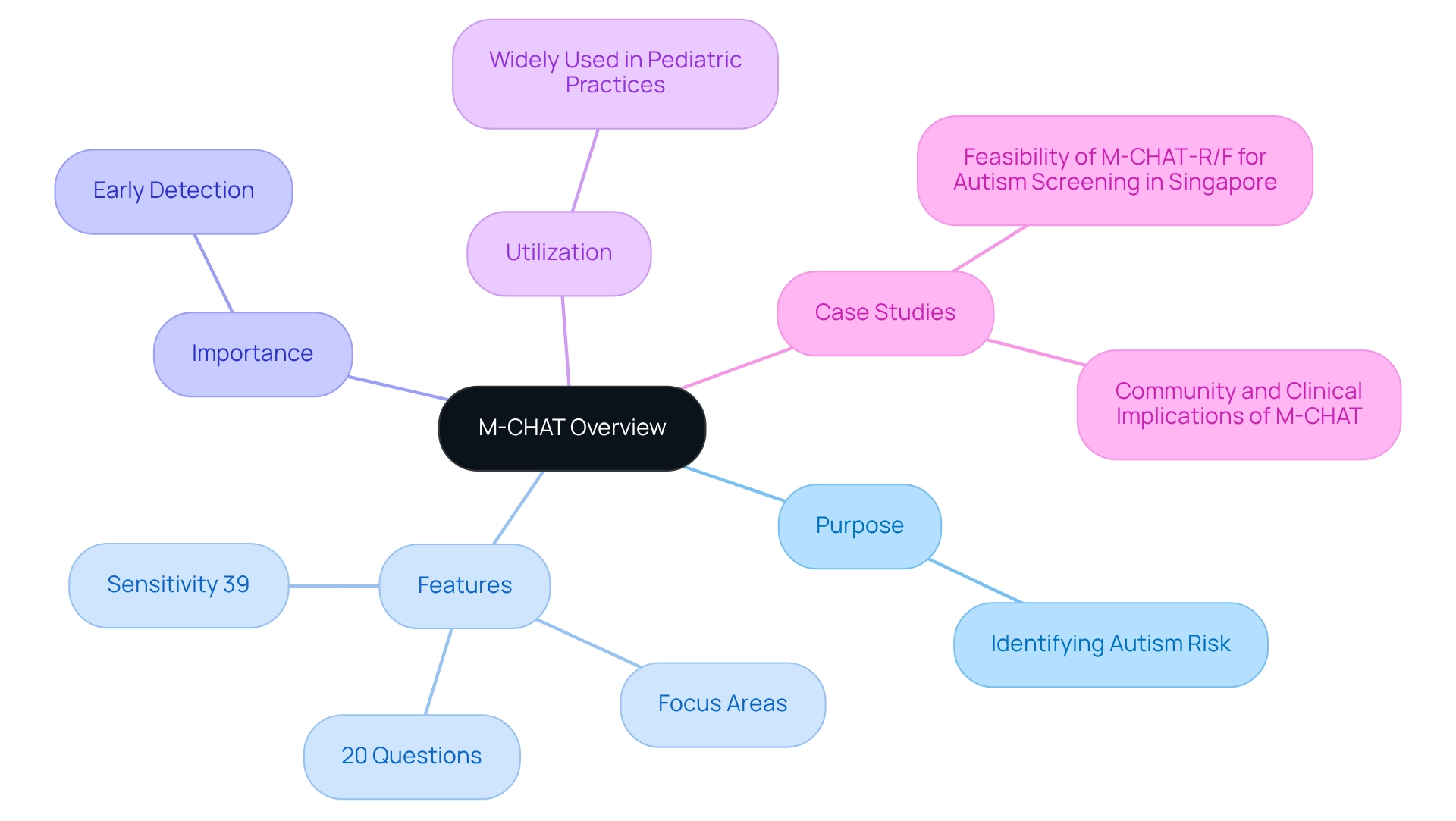
Importance of Early Screening: Detecting Autism Early with M-CHAT
Early screening for autism is essential, as it enables timely intervention that can lead to significantly improved developmental outcomes for your child. The Modified Checklist for Autism in Toddlers (M-CHAT) is a valuable tool, known as mchat autism, that helps identify children at risk for Autism Spectrum Disorder (ASD) before they reach crucial developmental milestones. Supported by a grant from the National Institute of Mental Health, research shows that children diagnosed early can access therapeutic services that enhance their social and communication skills, resulting in an average IQ increase of 17 points for those receiving prompt interventions. This improvement is closely linked to better communication, socialization, and behavioral outcomes, underscoring the effectiveness of early intervention strategies.
Moreover, specialists emphasize that utilizing screening tools like the mchat autism not only aids in early identification but also empowers parents to seek essential support services. This proactive approach ultimately improves the quality of life for your child. As recent findings advocate for early intervention, we encourage you, as parents and caregivers, to act promptly, ensuring your children receive the best possible start in life.
At ASD Media, we are dedicated to providing resources that support families affected by developmental disorders. We believe in the importance of teamwork and development within the ABA therapy sector, and we are here to help you navigate this journey together. Your child's future is bright, and with the right support, they can thrive.
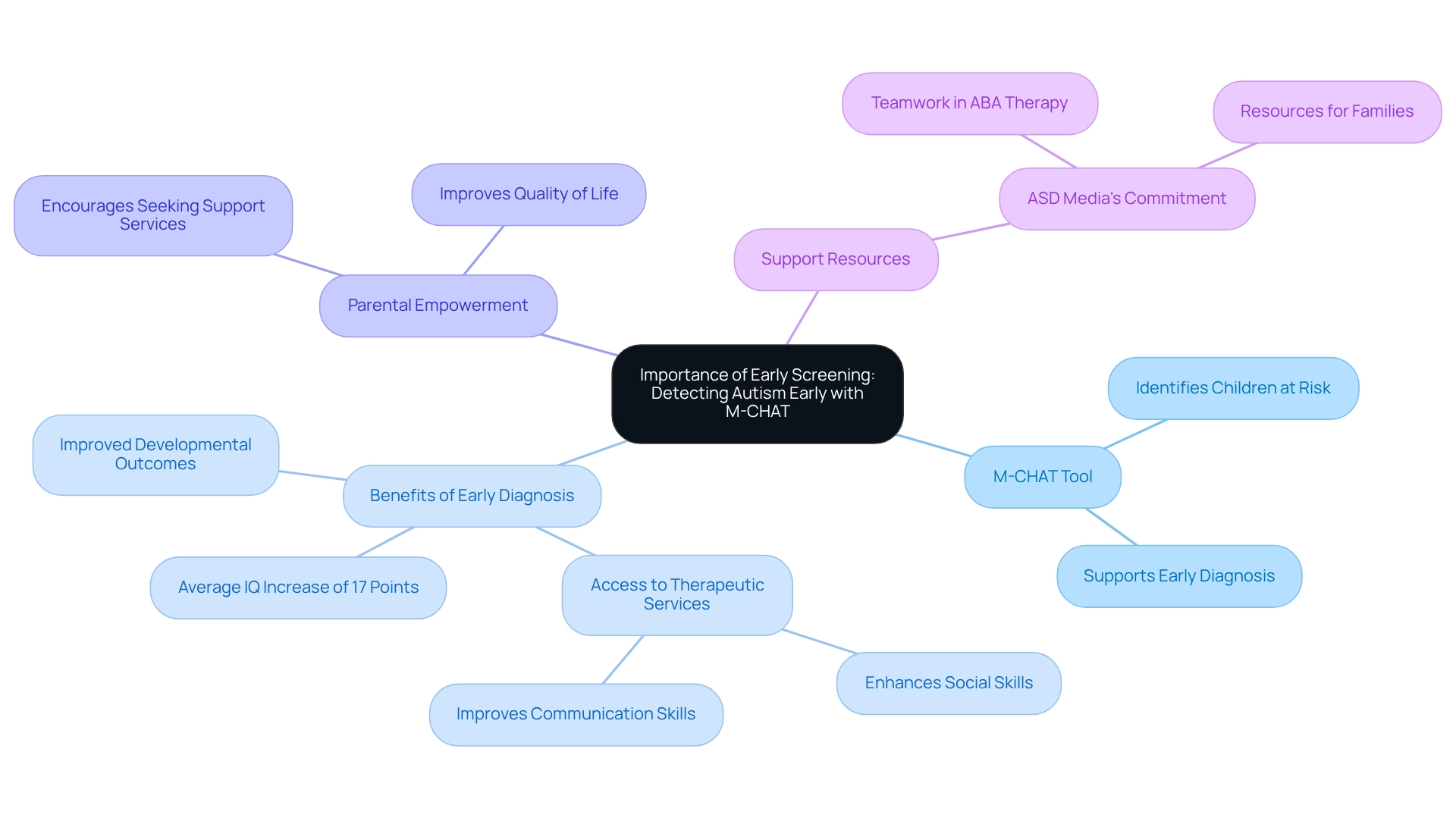
Recommended Age for M-CHAT: Optimal Screening Timeline
The Modified Checklist for Autism in Toddlers (M-CHAT) is ideally conducted at 18 and 24 months during regular pediatric examinations to assess mchat autism. These ages are pivotal, aligning with significant developmental milestones, which allows for early detection of autism spectrum disorder (ASD). Research indicates that children assessed with this screening tool receive a diagnosis at an average age of 25 months, more than a year earlier than the current median diagnosis age in the United States. This highlights the tool's potential to facilitate timely interventions that can significantly enhance long-term outcomes for children with ASD.
Parents are encouraged to actively engage in discussions about mchat autism with their pediatricians during these crucial visits. Proactive conversations can ensure that evaluations occur at the appropriate times, in line with expert recommendations. A meta-analysis of the M-CHAT-R/F, which included nearly 50,000 participants, revealed a positive predictive value (PPV) of 57.7% and a negative predictive value (NPV) of 72.5%. This underscores the tool's reliability while also pointing to the necessity for further evaluations after a positive screen. As Ramkumar Aishworiya pointed out, "This selective sample loss and the individual study’s handling of this sample could have distorted estimates of PPV across studies," emphasizing the importance of considering study limitations when interpreting results.
Current guidelines advocate for these evaluation timelines, and pediatricians are increasingly recognizing the importance of discussing mchat autism during check-ups. Statistics show that many pediatricians recommend assessments at these key ages, underlining the significance of parental involvement in these essential conversations to support their children's developmental well-being. Additionally, it is vital to acknowledge that seizures affect one in 16 youth with ASD, highlighting broader health factors that reinforce the need for early detection. Parents can prepare for these discussions by asking specific questions about the screening tool, expressing any concerns regarding their child's development, and requesting that the assessment be included in their child's routine check-up.
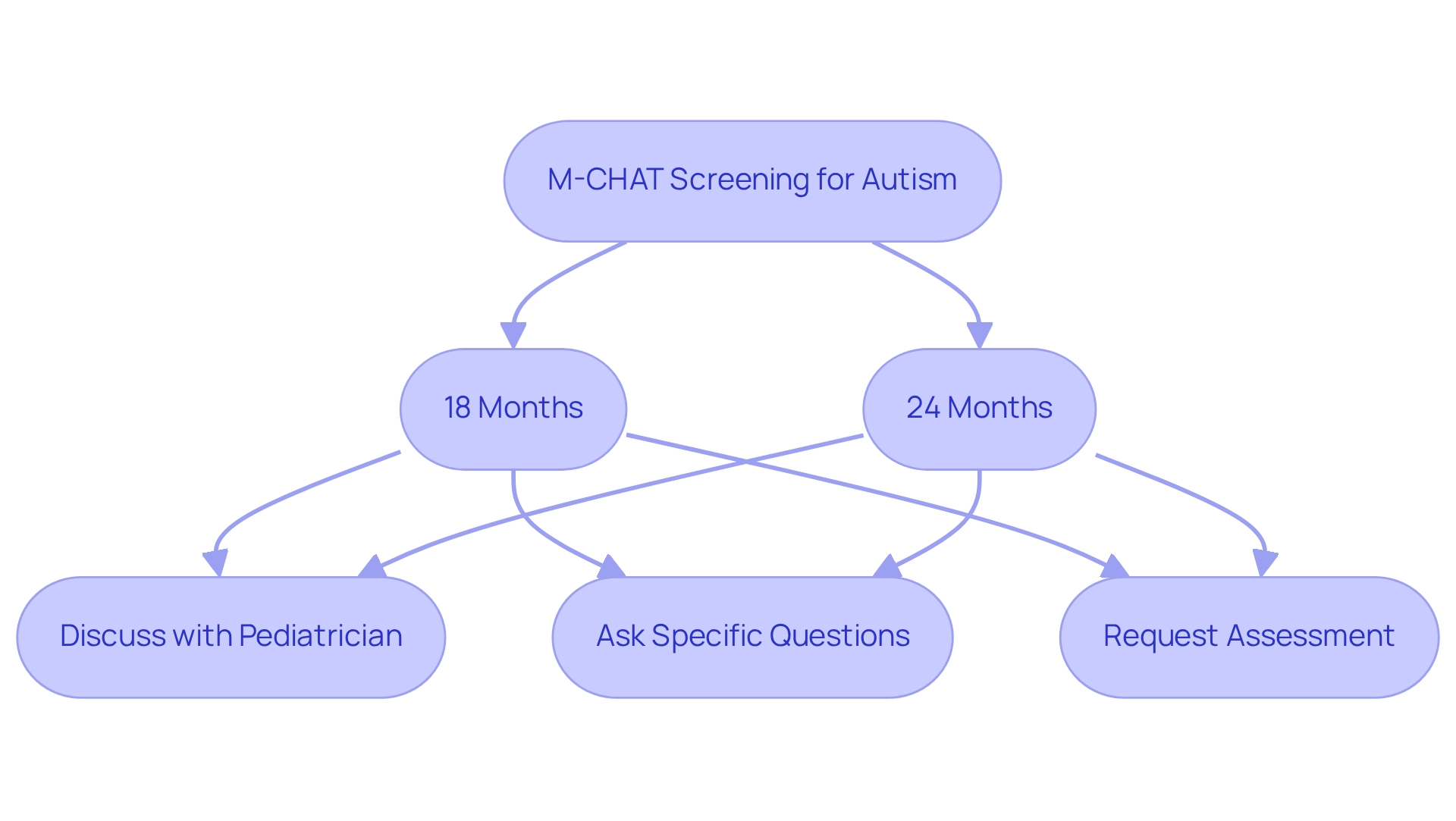
M-CHAT Scoring: Understanding Your Child's Results
M-CHAT Scoring: Understanding Your Child's Results
M-CHAT scoring is designed to be user-friendly and accessible for parents. A score of 0-2 indicates a low likelihood of the condition, suggesting that no urgent action is necessary. In contrast, a score ranging from 3 to 7 points to a moderate likelihood, which calls for further evaluation. Scores of 8 or higher in the mchat autism indicate a high likelihood of autism, prompting parents to seek a professional evaluation without delay. Understanding these scores from the mchat autism assessment is essential for parents, as it equips them to navigate subsequent steps effectively.
Research indicates that approximately 20% of youths score in the low range, while 30% fall into the moderate category, and about 50% receive high likelihood scores. This distribution highlights the significance of thorough assessments after preliminary evaluations, as numerous young individuals may need extra assistance and resources according to their scores.
Dr. Bernard Rimland, a trailblazer in autism studies, emphasized the importance of comprehensive assessments, stating, "Grasping the subtleties of screening instruments is vital for parents to guarantee their offspring receive the suitable assistance." Moreover, case studies have shown that the effectiveness of the screening tool can differ across various languages and cultural contexts, underscoring the necessity for cautious interpretation of findings in diverse populations.
Many parents who have successfully navigated the next steps report that understanding the screening results related to mchat autism empowered them to advocate for their children's needs, leading to timely interventions and enhanced outcomes. To effectively advocate for your child, consider discussing the screening results with your healthcare provider and exploring additional resources that can support your child's development. Remember, you are not alone on this journey—there are people and resources ready to help you every step of the way.
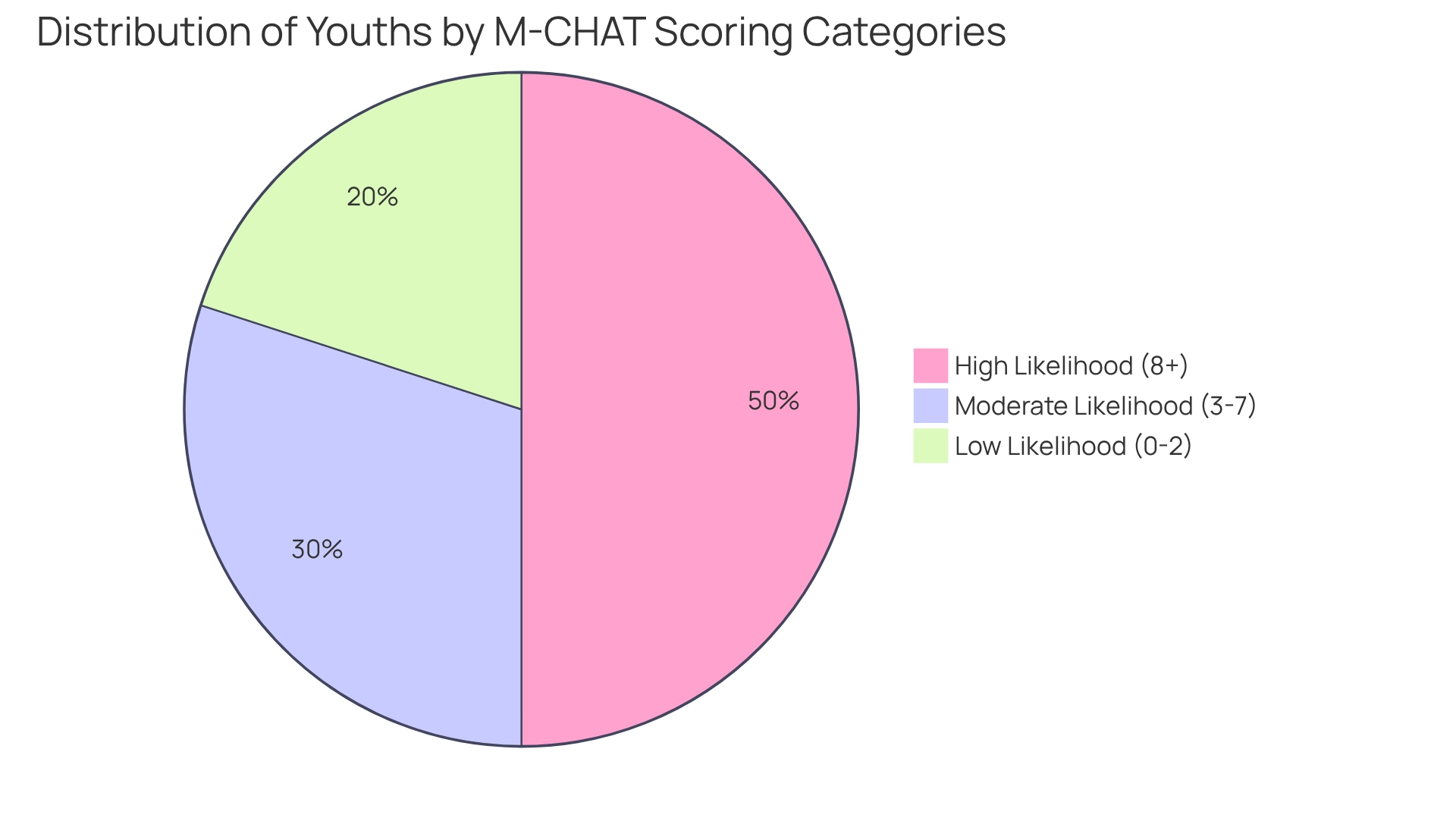
Next Steps After M-CHAT: What Parents Should Do
Upon completing the mchat autism, it's vital for parents to have a heartfelt discussion about the results with their pediatrician. If the score indicates a possible risk for mchat autism, the pediatrician will likely suggest a referral to a specialist for a comprehensive evaluation. This step is crucial, as timely evaluations can lead to early interventions that significantly improve outcomes for children.
Parents should also consider exploring early intervention services, which are designed to provide essential support and resources tailored to their child's unique needs. Research shows that early intervention can lead to meaningful improvements in communication, social skills, and overall development. Dr. Sally Ozonoff emphasizes, "Early intervention is critical; it can change the trajectory of a child's development and improve their quality of life."
Moreover, connecting with local support groups for families facing developmental disorders can be incredibly beneficial. These groups not only offer community resources but also provide emotional support, helping parents navigate the complexities of autism care. Engaging with these networks can empower families and foster a sense of belonging during challenging times. The case study titled "Recommendations for Comprehensive Developmental Monitoring" underscores the necessity of ongoing developmental monitoring and repeated screenings, reinforcing the importance of continuous support and resources for families.
Statistics reveal that about 70% of parents take proactive steps after screening results, with many seeking referrals to specialists and early intervention services. This proactive approach is essential for maximizing the potential for positive developmental outcomes. Furthermore, ongoing research in spectrum disorders highlights the need for continuous monitoring and assistance, ensuring that families have access to the latest insights and strategies.
Benefits of M-CHAT: Why Use This Screening Tool?
The Modified Checklist for Autism in Toddlers (M-CHAT) provides numerous advantages, especially its user-friendly design and swift administration process, making it a vital tool in mchat autism. This assessment tool is recognized for its reliability in identifying children at risk for autism spectrum disorder (ASD) through mchat autism, paving the way for early intervention that can significantly enhance developmental outcomes. Research consistently validates the effectiveness of the mchat autism, highlighting its improved utility over previous versions, such as the original M-CHAT. For instance, a recent study confirmed that the mchat autism, an updated edition, demonstrates greater effectiveness in assessing low-risk toddlers, further solidifying its reputation as a trustworthy resource for both parents and healthcare providers.
Moreover, statistics reveal that children whose parents express concerns about autism often have a higher likelihood of screening positive, with studies indicating that approximately 30% of these children are identified as at risk. This underscores the importance of utilizing the screening tool in various environments. As Dr. Robins, co-owner of the organization, notes, "Both sites asked physicians to identify cases of possible ASD, and these families were offered evaluation regardless of the R/F score."
Ultimately, the mchat autism stands out as a vital resource in the developmental evaluation landscape, empowering parents to take proactive steps in their children's developmental journeys. By understanding the significance of early screening, parents can better navigate their concerns and seek the support they need.
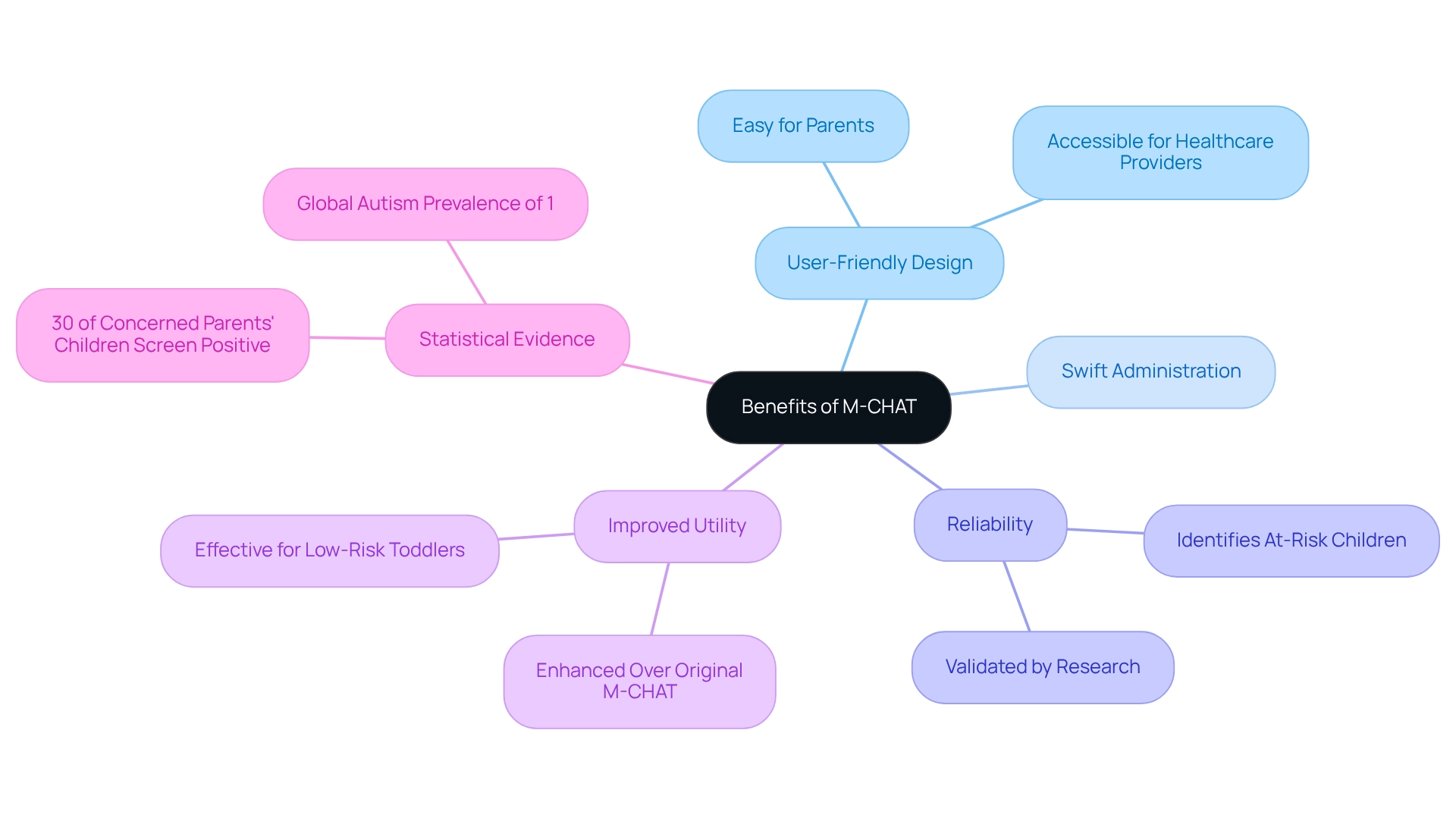
Limitations of M-CHAT: Understanding Its Boundaries
The tool serves as an essential first assessment resource for developmental disorders, yet it comes with significant drawbacks that parents should be aware of. One major concern is the presence of false positives, where the screening indicates a risk of developmental disorders when none exists, and false negatives, where it fails to recognize young individuals who do have such conditions. Research indicates that nearly 60 percent of toddlers who warranted a follow-up interview did not receive one, underscoring the need for further evaluation after a positive result. This highlights the importance of early action, as proactive steps following mchat autism screening results can greatly influence outcomes for individuals with autism.
Moreover, the mchat autism tool is primarily designed for toddlers, raising questions about its effectiveness for older youths. Recent research emphasizes that as youngsters grow older, the assessment may not reflect the subtleties of their developmental difficulties. For instance, a case study on communication deficits in toddlers with autism revealed significant impairments compared to typically developing peers, emphasizing the necessity for early intervention strategies that extend beyond initial screenings. These communication challenges can become more pronounced as children grow, further complicating the assessment process.
Specialists in the area have indicated that a favorable screening outcome should not be regarded as a conclusive diagnosis but rather as a cue for additional professional evaluation. Whitney Guthrie, a clinical psychologist, observes, 'It reflects how challenging this two-stage evaluation is in real primary care,' emphasizing the difficulties of accurately interpreting mchat autism results. Understanding the potential for false positives and negatives is essential for parents, as it can significantly influence the subsequent steps in seeking support and intervention.
Additionally, disparities in ASD screening and intervention may vary by location, affecting access to timely evaluations and resources. By being aware of these limitations, parents can better navigate the complexities of evaluations and advocate effectively for their children. As a proactive measure, parents should seek additional evaluation or assistance from qualified experts if they have concerns about their child's development, ensuring they take the necessary actions to support their needs.
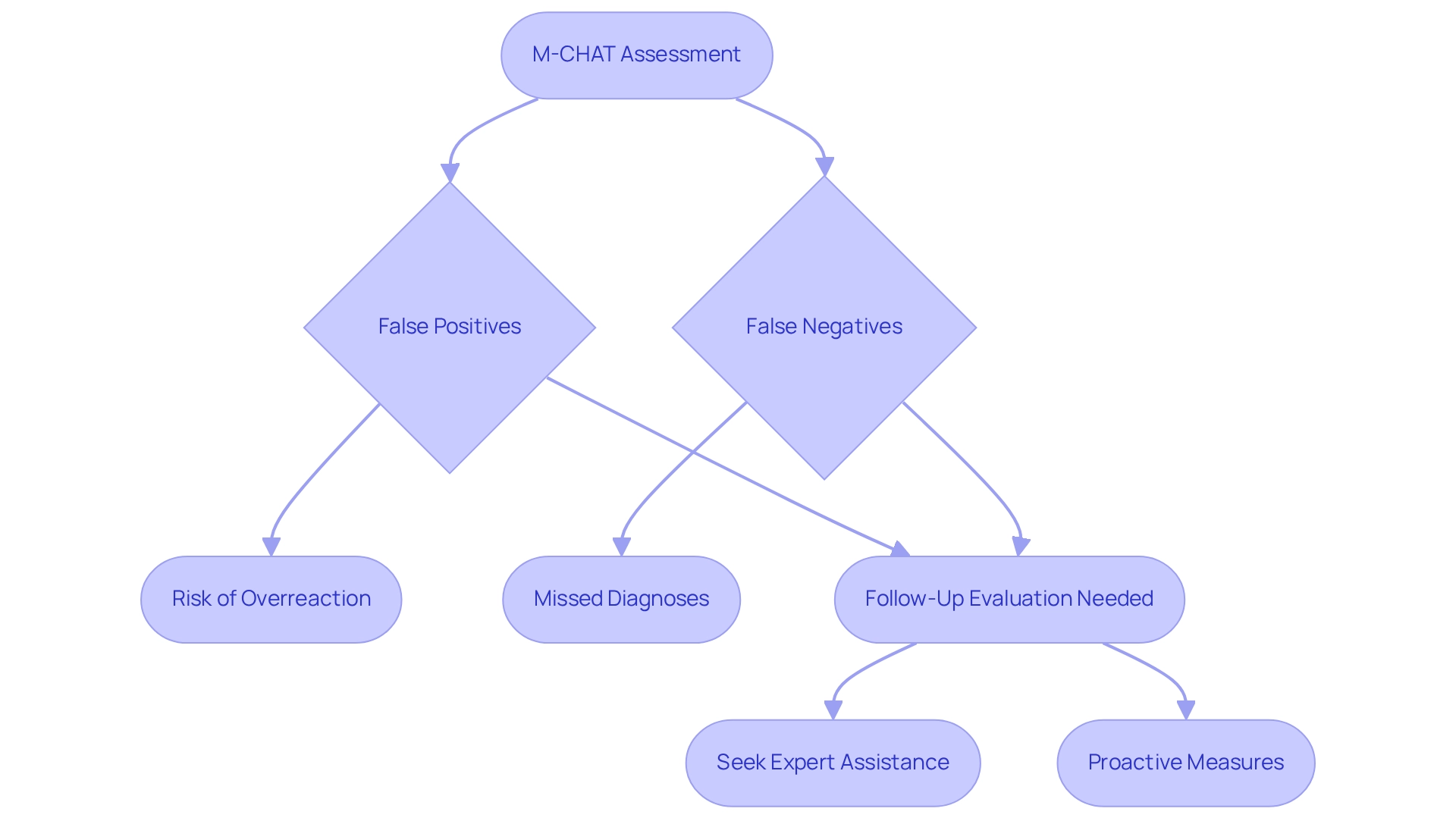
Professional Evaluation: Complementing M-CHAT Results
When concerns arise regarding developmental disorders, it becomes essential for parents to seek a professional evaluation. This evaluation involves gathering a detailed developmental history and conducting behavioral assessments, which may include standardized testing. Such a comprehensive approach provides a holistic view of the individual’s unique abilities and challenges.
Skilled experts, including pediatricians and psychologists specializing in autism spectrum disorders, carry out this evaluation. It is crucial for confirming a diagnosis and formulating an effective intervention strategy tailored to the individual’s specific needs, and research underscores the importance of using assessment tools like M-CHAT autism alongside regular developmental monitoring. This combination significantly enhances the early identification of autism spectrum disorder (ASD).
A study has validated the M-CHAT autism tool, known as the Modified Checklist for Autism in Toddlers, Revised with Follow-up (M-CHAT-R/F), as an effective assessment for low-risk toddlers, highlighting the necessity of professional evaluations following positive results. By integrating these assessments, prompt interventions can be initiated, which are vital for improving long-term outcomes for affected youth.
Furthermore, statistics indicate that the average correlation between parent-reported assessments, such as the ABAS-3 and Vineland-II, is 0.66, reflecting a strong relationship among different evaluation methods. These assessments provide valuable insights into a young person’s functioning and are often used alongside professional evaluations to inform educational planning.
Psychologists advocate for thorough assessments following M-CHAT autism results, emphasizing that these evaluations not only confirm initial screenings but also reveal the individual’s strengths and weaknesses—key elements for effective educational planning. For example, the Leiter International Performance Scale is specifically designed for nonverbal individuals, ensuring that every young person receives appropriate evaluations, regardless of their communication abilities.
Parents can anticipate a comprehensive process during a professional evaluation, which may include interviews, observations, and various standardized tests to assess different developmental areas. Ultimately, pursuing a professional assessment is a crucial step in the diagnostic journey, paving the way for effective strategies to support individuals with ADHD and related conditions.
Key Takeaways: Essential Facts About M-CHAT for Parents
The Modified Checklist for Autism in Toddlers (MCHAT autism) serves as a vital tool for identifying children at risk for autism between the ages of 16 and 30 months. Early screening is crucial, as it opens the door to timely interventions that can significantly enhance developmental outcomes. As parents, becoming familiar with the scoring system and understanding the essential steps following the assessment is key. This includes recognizing the importance of seeking professional evaluations. Remember, "It is always recommended to consult with a qualified professional who can guide you through the assessment process and help determine the most suitable tool for your specific situation." Importantly, the Follow-up portion of the M-CHAT-R/F plays a significant role in easing the strain on diagnostic systems, ensuring that children receive the appropriate attention when needed.
While the mchat autism is a trusted resource for both parents and healthcare providers, it is essential to acknowledge its limitations. Recent findings show that repeated evaluations at 18 and 24 months, as recommended by the American Academy of Pediatrics, can enhance diagnostic sensitivity by 11% to 45%. This highlights the importance of adhering to recommended assessment protocols. Following up with screenings is vital for improving diagnostic outcomes. Additionally, it’s been observed that diagnostic accuracy can vary based on language, with non-English samples demonstrating greater accuracy compared to primarily English samples. This underscores the need for careful consideration of language factors during the assessment process.
In summary, the screening tool remains an invaluable resource in the early identification of mchat autism, empowering parents to take proactive measures in their child's developmental journey. By understanding the benefits of M-CHAT autism—such as early identification and intervention—and its limitations, including variability in diagnostic accuracy based on language, parents can navigate the M-CHAT process more effectively. This ensures that their children receive the support they truly need.
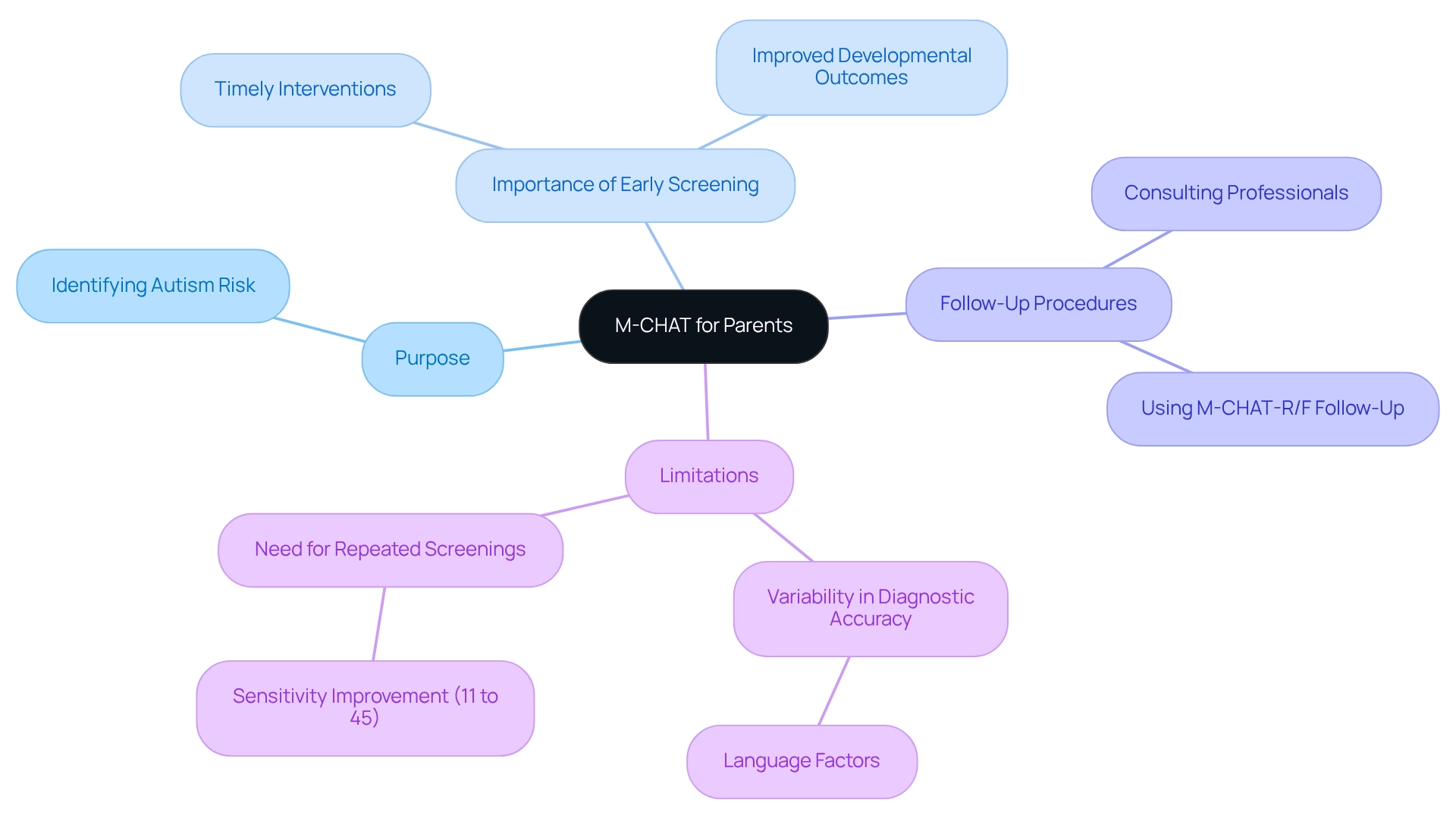
Conclusion
The Modified Checklist for Autism in Toddlers (M-CHAT) is a vital resource for early detection of Autism Spectrum Disorder (ASD), empowering parents and caregivers to identify potential risks during crucial developmental stages. By grasping the M-CHAT scoring system and initiating proactive discussions with pediatricians, families can facilitate timely interventions that greatly enhance developmental outcomes. Evidence highlights the significance of early screening, as children diagnosed at younger ages often exhibit improved social, communication, and behavioral skills.
Yet, it is equally essential for parents to understand the limitations of the M-CHAT, including the possibility of false positives and negatives, which necessitate further professional evaluations. These evaluations are pivotal in confirming diagnoses and customizing intervention strategies to cater to each child's unique needs. By merging the insights gained from the M-CHAT with comprehensive assessments, parents can become effective advocates for their children, ensuring access to the appropriate resources and support.
Ultimately, the journey of navigating autism screening and intervention is a collaborative endeavor that calls for active engagement from families, healthcare providers, and support networks. By cultivating a community rooted in understanding and resources, families can guarantee that their children receive the best possible start in life, opening the door to a brighter future filled with opportunities for growth and development.
Frequently Asked Questions
What is the mission of ASD Media?
ASD Media's mission is to empower parents and professionals to unlock the potential of children with ADHD by providing effective strategies for managing challenging behaviors, navigating support services, and enhancing social skills development.
How does ASD Media support families and professionals?
ASD Media offers valuable insights and strategies to address the unique challenges faced by families and professionals, providing a comprehensive range of resources designed to support parents and caregivers and fostering a collaborative environment for sharing experiences and knowledge.
What resources does subscribing to the ASD Media newsletter provide?
Subscribing to the ASD Media newsletter gives individuals access to the latest updates and unlimited digital resources tailored to their needs.
What is the financial impact of developmental disorder therapy?
The average annual cost of therapy for developmental disorders is around $60,000, highlighting the importance of insurance coverage for equitable access to necessary therapy services.
What role does family involvement play in ABA therapy?
Recent trends suggest that children with married or partnered parents are more likely to remain engaged in ABA therapy for extended periods, emphasizing the critical importance of family involvement in the therapeutic process.
What is the Modified Checklist for Autism in Toddlers (M-CHAT)?
The M-CHAT is a screening tool featuring 20 yes-or-no questions that help identify children at risk for Autism Spectrum Disorder (ASD) by focusing on crucial developmental areas like social interaction, communication skills, and behavior.
At what age is the M-CHAT typically administered?
The M-CHAT is typically administered to children aged 16 to 30 months.
Why is early screening for autism important?
Early screening enables timely intervention, which can lead to significantly improved developmental outcomes for children diagnosed with autism.
What are the benefits of early diagnosis and intervention?
Children diagnosed early can access therapeutic services that enhance their social and communication skills, resulting in an average IQ increase of 17 points for those receiving prompt interventions.
How does ASD Media view the importance of teamwork in the ABA therapy sector?
ASD Media believes in the importance of teamwork and development within the ABA therapy sector and is dedicated to providing resources to help families navigate their journey effectively.




